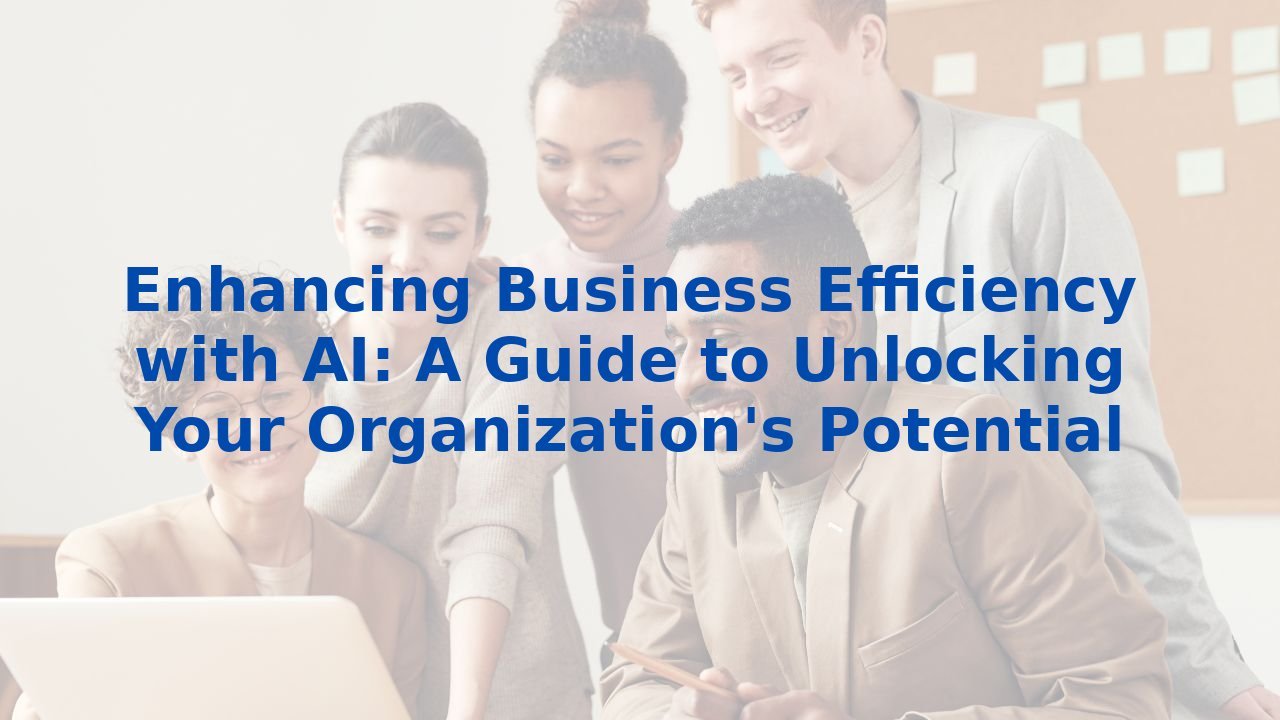Enhancing Business Efficiency with AI: A Guide to Unlocking Your Organization's Potential
Enhancing Business Efficiency with AI: A Guide to Unlocking Your Organization's Potential
In a landscape where competition is fierce and change is the only constant, the hunger for efficiency is no longer an option but a necessity. Organizations are turning to Artificial Intelligence (AI) as a powerful ally in their quest for excellence. This guide will navigate through the ways AI can transform business processes, spotlighting its role in elevating efficiency and the accompanying need for employee training. Let’s dive in.
1. Improving Decision-Making
The tides of decision-making are shifting. Traditional methods are giving way to AI's prowess in analyzing vast datasets with speed and precision. Imagine a marketing team leveraging AI to dissect consumer behavior, crafting campaigns that resonate deeply. Meanwhile, in supply chain management, AI fine-tunes logistics and inventory, leading to not just quicker decisions but smarter ones—decisions that propel organizations forward.
2. Automation of Repetitive Tasks
One of AI's standout features is its knack for automating monotonous tasks. Think of AI-powered chatbots fielding customer inquiries, or automation tools taking on mundane administrative duties like scheduling and data entry. This is not just about reallocation of workflow; it's about liberating your workforce. Freed from tasks that do not require the creative spark of a human mind, employees can pivot to higher-level functions where their talents shine brightest.
3. Enhancing Customer Experience
Today’s consumers crave personalization. AI can analyze customer data to offer tailored recommendations, heightening engagement and satisfaction. Businesses that utilize AI not only enhance their service quality but also anticipate customer needs effortlessly. The result? A loyal customer base that feels understood and valued—an essential ingredient in a competitive marketplace.
4. Driving Innovation and Cost Reduction
Innovation is the lifeblood of progress, and AI serves as a catalyst. In fields like pharmaceuticals, for example, AI expedites drug development by aiding in the design and efficacy prediction of new compounds. The manufacturing sector also relies on AI to streamline production and allocate resources efficiently, thus reducing waste and driving down costs. Predictive maintenance powered by AI foresees equipment failures before they happen, translating to eliminated downtime and enhanced operational efficiency.
5. Boosting Productivity and Efficiency
Picture a work environment where smart decisions are made in an instant, processes are optimized, and every team member is a paragon of efficiency. AI holds the key to achieving this high-functioning dynamic. By handling tasks at an unparalleled scale and speed, it allows employees to concentrate on strategies and initiatives that require human ingenuity, ultimately enhancing business performance.
6. Effective Resource Management
If resources are your organization's lifeblood, then AI acts as a skilled engineer fine-tuning every process. In project management, the assistance of AI in planning and monitoring tasks facilitates precise resource allocation, ensuring projects are completed successfully and efficiently. This level of resource management not only elevates project success rates but also enhances overall organizational effectiveness.
7. Reducing Human Error and Improving Quality
Human error can wreak havoc on any operation, but AI stands as a guardian against these pitfalls. By automating repetitive tasks and employing advanced algorithms, AI drastically minimizes the likelihood of errors, ensuring adherence to quality standards. In financial reconciliation, for instance, the precision offered by AI generates near-flawless results—far beyond what any human could consistently replicate.
8. Leveraging Generative AI for Efficiency
Generative AI is reshaping the landscape of routine workflows and costs. It’s capable of producing advanced, personalized content for marketing initiatives, revolutionizing customer service experiences, and expedited programming tasks. In research and development, this technology works relentlessly to speed up innovation, allowing companies to adapt and create at an unprecedented pace.
9. The Importance of Employee Training
Yet, even with these remarkable tools at our fingertips, the full promise of AI cannot be realized without investing in employee training. Familiarizing your workforce with AI capabilities empowers them to leverage these technologies effectively. Upskilling employees to navigate and harness AI not only transforms individual performance but strengthens the organization as a whole. When employees learn to employ AI tools to enhance productivity, the potential for innovation and efficiency skyrockets.
Conclusion
As we journey into a future defined by digital possibilities, integrating AI into business processes isn’t just wise—it’s vital. From enhanced decision-making to improved customer experiences and significant error reduction, the benefits are vast. Your organization stands to gain a competitive edge by not only embracing AI but also by empowering your team through robust training. Remember, the future of business is extraordinarily bright for those willing to evolve and adapt.



